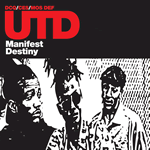|
|
 |
Dusted Reviews
Artist: UTD / Medina Green Album: Manifest Destiny / U Know the Flex Label: Illson Media Review date: Jan. 25, 2005 |

|
|
|
 |
Last month, I caught Mos Def live, supporting his recent full-length release, The New Danger. In the course of two hours, Mos Def limited most of his performance to material from the acclaimed 1999 LP Black on Both Sides and his more recent and, frankly, tepid solo work. For this fan, however, the most energetic parts of Mos’ set were songs that predated those albums, or even 1997’s Black Star, his signature piece of socially conscious hip hop recorded with Talib Kweli. That night, classics like 1996’s “Universal Magnetic,” written by a greener Mos Def for defunct underground armory Rawkus Records, were buoyant alongside his newer, more mature and stately sound.
Though Mos has certainly grown as a writer and artist since 1996, his early work bubbles with a ripening charisma. Two recent releases, UTD’s Manifest Destiny and Medina Green’s U Know the Flex Mixtape Volume 1, document Mos Def’s earliest recorded work, as well as some of his more recent, non-solo production. There are a few bright spots on these records, but nothing to equal Mos Def at his peak - listeners won’t find the poet of Black Star’s “Respiration” or the griot of Black on Both Sides’ “Miss Fat Booty.”
UTD and Medina Green both feature Mos Def and his younger brother, DCQ, a competent rapper who, at his best, sounds like a harder-nosed Q-Tip. UTD, a trio that broke up by early 1996, also featured Ces, a female rapper who was easily the loudest of the three rappers. Manifest Destiny, recorded in 1994 but because of label squabbles, not released until last month, is a true team effort, with each rapper receiving equal space on the album. But like most sports teams with no superstar - an 18-year-old Mos Def was still cutting his teeth - UTD was staunchly mediocre. There are a few glimpses of Mos’ later flash. His sung introduction to “My Kung Fu” eerily evokes Black on Both Sides’ “Umi Says,” and throughout Manifest Destiny Mos sounds comfortable behind the microphone, if not necessarily compelling. On the whole, though, Manifest Destiny is flat, with few of the surprises or novel takes on hip hop we have come to expect.
If UTD sounds like a team full of role players, then Medina Green’s mixtape is like a superstar surrounded by scrubs. There are more highlights on U Know the Flex than on Manifest Destiny, but almost all because of Mos Def’s lyrical acrobatics. “Beef,” a 2003 freestyle viewers may have caught Mos perform on The Dave Chappelle Show, is particularly impressive. Written in the wake of the Jay-Z/Nas feud, the song juxtaposes rappers’ so-called “beef” against the trials of African-American life. Mos recites, “Beef is when your girl come through for a visit / To tell you that she’s pregnant by some other nigga / Beef is high blood pressure and bad credit / Need a loan for your home / But you’re too broke to get it. Even if the material Mos recorded for Rawkus after his stint with UTD was effervescent, it lacks the later boldness of songs like “Beef.”
When Mos Def is not rapping, however, U know the Flex is nowhere near as captivating. DCQ and his assorted guests lack Mos’ mix of affability and sophistication. By themselves, they cannot carry the record. One song featuring Mos Def, however, does capture the kind of chemistry underground hip hop classics are made of. “Crosstown Beef,” from Rawkus’ 1999 Soundbombing II compilation, is like a cruise through a cleared downtown boulevard. It is not fast or bottlenecked, but smooth and controlled. DCQ and Mos Def go verse for verse about gun violence - a topic that an older Mos Def would most definitely qualify as real beef - but the song’s most entertaining moment is its ending, a mock phone call between DCQ and guest Lord Ato, playing a prison inmate.
Together, DCQ and Lord Ato’s combine their limited appeal to a sum greater than its parts; their rapped give-and-take is more inviting than Mos’ one-man show. It’s a small wonder why Medina Green, or UTD for that matter, did not recite verses together more regularly.
By Ben Yaster
|







